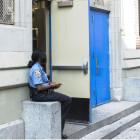
School Resource Officers: A Topic of Hot Debate, Even Prior to Sandy Hook
|
In the aftermath of the deadly shooting last month at Sandy Hook Elementary School in Newtown, Conn., intense public debate has focused on protecting students – and the role of student resource officers (SROs), in particular – in the event of future shooting sprees. Generally, school resource officers are local law enforcement officers appointed to patrol schools and handle juvenile disciplinary issues. The effectiveness of SROs is highly debated. A National Association of School Resource Officers (NASRO) report claims the presence of SROs has reduced juvenile arrests in some schools by nearly 50 percent. On the other hand, the Justice Policy Institute issued a report that found SROs had little effect on curbing criminal activity in schools, and may even lead to inflated, and potentially unnecessary, juvenile arrests.



